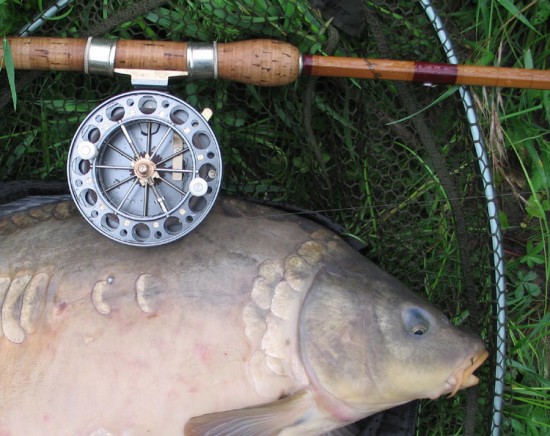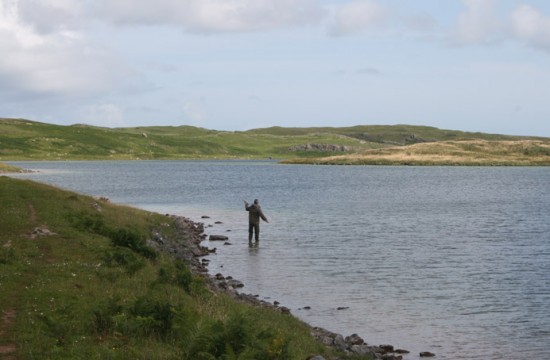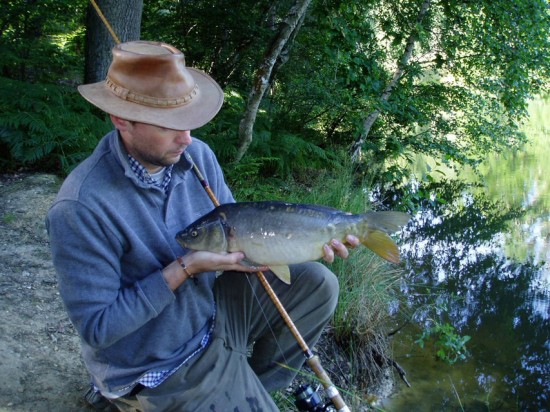The first of a new monthly column by longtime Caught by the River contributorJon Berry.
April:
I am hunting for water right now – deep, secretive fishing water – because it is what I always do at this time of year. As soon as the clocks go forward and the evenings grow longer, the prospecting can begin.
It’s not just ordinary water that I am looking for. Much as I love unremarkable, proletarian lakes and rivers, there are enough in my life already. In the shadow of a church only three-hundred yards from my door is a pond, and its small carp are delightful. Half-a-mile away, where the silence of the village is broken by a main road, the first trickles of a tributary gather pace, passing through a benign agrarian landscape before joining the Bristol Avon. This stream has fish, of course, good ones too – and when autumn arrives I shall go and catch some. But both these places are known and accounted for, and are home to the ghosts of generations of fishermen; they were hunted out a long time ago.
I know the kind of place I am looking for – a pool with lily-strewn margins, or huge beds of reeds where the pike hide until winter. A place with shallows over gravel where new fry skitter among the frogs each spring, and with a middle so deep that light never touches its stones. There will be ancient trees and, perhaps, an abandoned boat house. When I stumble upon it, I will be alone.
I came close to finding such a place two years ago, but it was almost a thousand miles away. There were no carp or pike there, its fluid limestone heart was filled with trout, but in many respects it was the lake I have long looked for.
We were in Cape Wrath, on land owned by a remote hotel, and the water we fished that day – and ‘we’ in this instance meant Cousin Ricky, Girlfriend Vic, rheumy old Dougie and me – was anything but secret. But it was so far off any beaten track that we saw no-one, heard only the mew-mew of a buzzard and the squawk of gulls, and hunkered against the constant spray which blew in from the North Sea. The lake – which, being there, was a loch – was small by the standards of the Highlands. It was a two-boat place that could be covered in a day, but what it lacked in circumference it gained in depth. The clear water faded sharply and suddenly to black only yards from shore. The banks sloped steeply, all heather and sheep shit, and there were places we could not reach by boat or by foot. We had been told that its bottom was littered with debris from crashed WWII bombers, crew and all, and we believed it too. It was that kind of place.
We cast with dries and nymphs, variations on the ubiquitous gold-ribbed hare’s ear theme that is the mantra of all fly fishermen who are guessing. For much of the day we caught nothing, but as the afternoon faded and the temperature dropped there was a brief rise. We couldn’t tell what the fish were feeding upon, but our GRHEs were close enough and we caught. Dougie – who, as a Highlander, pronounces his name to rhyme with boogie – caught the first. We pounced on him and on the small bay where he had found the fish, and shared the bounty. The loch became benevolent, briefly and wonderfully so, but the rise soon ended and its mystery returned. When darkness came and forced us to leave, we were in awe.
I glanced back as Dougie’s old Volvo climbed the hill path out to the main road, and wished that loch had been in Wiltshire – with carp or tench in it.
Of course, there are no lochs here in Wiltshire. The trout live in streams or in vast concrete bowls and the bombers land safely at Lyneham. There are few buzzards, fewer gulls, and the beaten track is called the M4. Isolation is harder to find, but it is still worth looking for – and so I am.
When I find my water, it will be different to Cape Wrath, but its spirit will be the same; it will have beauty and depth and it will have its secrets. If I am very lucky indeed, it will be the lake I used to dream about in my teens and which still appears occasionally now, a quarter of a century later.
The dream was always the same and time has not changed it. I am in a car, a back seat passenger, and since I was fifteen when the dream first came it is probably an Austin Maxi, with Dad the reluctant driver. We are climbing a winding and wooded road. At its peak I look right, down in to a valley of lush forestry, and on the valley’s floor is a perfect lake. The perfect lake. It is small, two or three acres, dotted with lilies and encircled by a tangle of fallen trees. It is deserted but there is a boathouse at its farthest end and, as the car descends and the lake disappears from view, I see the first concentric circles of a rolling fish.
The dream has returned more times than I could count, and I have never seen the cause. Each time, I wake wishing I knew where it was – and knowing that it is somewhere. And that is why I have to keep looking.
April is the right time to begin. The hedgerows are losing their skeletal bleakness and returning to green. Heady scents of spring hit the back of my throat when I walk outside, and remind me that the carp and tench will be skulking beneath lily beds waiting for warmer days. The rivers, quite rightly, are closed to coarse anglers and it is too early to cast for the trout. But there is warmth in the south westerly that is blowing in right now, the nights are shorter and I know that soon, in restless sleep, my mind will conjure up a pool at the bottom of a valley. And when I wake, I shall carry on hunting, glancing to the right on every high and winding road.


